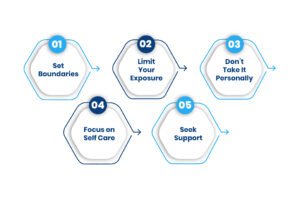Have you ever noticed a person behaving strangely or unusually? In fact, such a toxic personality is always pessimistic, manipulative, or appears to be indifferent to the feelings of others. So, it could be toxic behavior. These actions may be unnoticed or even ignored, which can have a permanent toll on the person emotionally.
The toxic traits should also be identified at an early stage, as they not only affect the individuals who exhibit them but also the individuals around them. By identifying and managing these behaviors, one can be able to establish healthier and happier environments for all. Toxic behavior is often not immediately apparent, as it may sometimes begin small, such as a few words of criticism or little manipulations.
What Is Toxic Behavior?
Toxic behavior creates emotional harm for others. These actions cause individuals to be angry, not important, or unsafe. As an example, a toxic personality may criticize you all the time. They might also attempt to interfere in your choices or even guilt you without any reason. In the end, such behavior undermines connections and negatively affects your health.
Moreover, toxic patterns are in many cases recurrent. An individual may bend circumstances to their liking. They can also decline to accept the responsibility for their offensive deeds. The first step towards self-protection is to be able to identify such pernicious habits.
Signs Of Toxic Behavior
The toxic behavior may take different forms, although there are several common signs that can be observed. These include:
- A toxic person never gives constructive feedback; rather, they criticize others all the time. This may result in feelings of inadequacy and self-doubt.
- Toxic people tend to play around with situations and people to achieve what they desire. They can manipulate people, whether by inducing feelings of guilt, flattering them, or using threats.
- It is an action that causes a person to doubt their truth. A toxic individual may lie or play down the truth or tell you that you are too sensitive.
- An individual with narcissistic behavior is concerned with oneself and ignores the emotions of others.
- Poisonous people tend to evade accountability for their acts. They fault others when they do wrong things and never accept responsibility for their actions.
- Lying, fake hood, or concealing critical information is a big signal. A poisonous individual may distort reality according to their story.
It is a form of pessimism and negativity that is always present, and it may drain the energy and the rest of the people surrounding them. They dwell on issues, not resolutions.
Toxic Behavior in a Relationship
Toxic relationship behavior hurts either or both partners. It conditions a state of pressure, anxiety, and discontent. One of the examples is that a partner may always inspect the phone of another or even dictate with whom they speak or whom they see. This eliminates trust and individual liberty in the relationship.
In addition, this negativity usually becomes a cycle. A partner may employ threats or ultimatums in order to have their way. They might also take you as a scapegoat for their unhappiness or errors. As a result, you might become lonely and might not know yourself anymore. These trends create a severe imbalance and may result in a long-term impact of a traumatic emotional state.
Toxic Behavior Examples
The following are some examples of toxic behavior:
- Continuous criticism of yourself leaves you with insufficient.
- The ability to control your company, or with whom to communicate.
- Feeling guilty to make you give it to them.
- Sanding off your emotions or convincing you that you are a moment.
- Using threats to demand the way you make choices.
- Initiating quarrels or drama often.
- It is finding fault with you because of their troubles or misery.
- Ransacking your personal privacy by peeking at your phone or e-mails.
How To Identify Toxic Behavior?
In order to detect toxic behavior, begin by noticing the way someone makes you feel. In case communication always makes you feel exhausted, nervous, or angry, there is a possibility of some toxic characteristics. Bad individuals tend to overstep your line, twist things, or discount your emotions. They can accuse others and refer to the fact that they made a mistake. These patterns may lead to emotional damage in the long run and affect your health.
Furthermore, the other method of identifying toxic behavior is to look at how people react to the individual. When two or more individuals show displeasure or irritation in their vicinity, that might be an indication of toxicity. Watch out for trends such as criticism, disrespectful communication, or negative energy.
Types of Toxic Behavior
1. Verbal Abuse
Verbal abuse comes through the use of words to belittle, insult, or demean someone. It may involve calling names, ridiculing, and making derogatory remarks. Such an act usually makes the victim feel worthless or humiliated. In the long run, it may have a devastating effect on self-esteem and self-confidence. In unhealthy relationships, verbal abuse is a type of control and manipulation.
2. Physical Abuse
Physical abuse encompasses any violence consisting of hitting, slapping, and pushing. This is more than just harmful; it is dangerous. It is a definite indication of unhealthy and unpleasant relationships. Most physical tortures tend to increase with time, resulting in more severe injuries. As soon as an incident of physical injury occurs, there is a necessity to get out of it.
3. Passive-Aggressive Behavior
Passive-aggressive behavior is a situation where one angrily or frustratingly communicates their anger or frustration. They may resort to sarcasm, procrastination, or the silent treatment. It is the means through which the individual can escape the actual confrontation and inflict emotional damage. Identifying such conduct is beneficial in solving the original problem.
4. Victimization
According to a situation, victimization occurs when a person continuously identifies themselves as a victim, irrespective of the context. In most cases, they are unwilling to accept the responsibility for their actions and are concerned with fault-finding. This habit may give rise to a vicious circle of guilt and manipulation. It discourages self-development and self-solving.
5. Entitlement
Entitlement is a feeling that one should have special treatment without having earned it. They want other people to satisfy their needs or wants, even though they do not think about the effects. This can be in the form of seeking attention, respect, or favor. The privileged persons tend to ignore others and their needs.
How To Deal with Toxic People?

1. Set Boundaries
Tragic personalities need boundaries. Explain what is not tolerated and keep within your limits. These limits should be constantly imposed. A toxic personality may seek to stretch your limits, and this is why you would be tough and challenging. Staying away from emotional space is a way of maintaining your well-being intact, and it reduces the adverse impact that it has on you.
2. Limit Your Exposure
The reduction of the time spent with toxic people is one of the strategies that are not difficult to learn but can be useful. In a case where socialization is necessary, keep the discussions short and to the point. The less contact you have, the less the poisonous nature of them will affect you.
3. Don’t Take It Personally
This toxic behavior is predominantly concerned with the individual who is the one who expresses the behavior, and not you. Do not drag your negativity there and affect your self-esteem. They are doing their problems and not yours. An emotional distance must exist between you and them so that nothing they say or do affects you. None of this should forget that it is not your responsibility to render them non-toxic.
4. Focus on Self-Care
A lot of caution is required when dealing with toxic people. Do things that make you feel energetic, like taking up a hobby, exercising, or spending time with good people. This will help you to be tough to the emotional weight of gossiping. Always make your mental and emotional well-being first in order to be strong and subtle.
5. Seek Support
Talking to people about the toxic people in your life will allow you to look at the situation objectively and get some of your feelings off. It may be your friends, family members, or a therapist, and this experience can cause you to labor with your emotions. A support system gives the justification and direction on how to handle the situation. It can only make a huge difference to realize that you are not alone sometimes. Seeking help would also assist you in making healthy steps.
Tips to Deal with Avoiding Toxic People
Here are the tips while dealing with a toxic person:
- Trust your instincts when something feels off and distance yourself.
- Recognize red flags like manipulation and constant negativity early on.
- Set firm boundaries and clearly communicate what is unacceptable.
- Prioritize positive relationships that uplift and support you.
- Don’t feel guilty for distancing yourself from toxic individuals.
- Limit contact with toxic people to protect your emotional well-being.
- Focus on your mental health and engage in activities that recharge you.
- Learn to say no to situations that drain your energy or cause harm.
- Be mindful of your energy and avoid unnecessary conflict.
- Seek professional help if toxic relationships affect your emotional health.
Final Thoughts
The toxic behavior can be very destructive, affecting not only the emotional and mental behavioral health of the person but also their physical health. It may take different shapes, both verbal and manipulation, and control. Often, the treatment of the toxic behavior presupposes the establishment of clear limits, attention to self-care, and, in some cases, professional assistance.
According to mental and behavioral health experts, it is necessary to work on the toxic behaviors at the early stages since they may harm the person in the long term. Understanding such behaviors and acting upon them can save your mind and enhance relations. Just remember that you should not be afraid to leave situations or even people who constantly hurt your well-being.
FAQs
What is toxic behavior?
Toxic behavior can be defined as those behaviors that hurt other people either emotionally or mentally and that result in harm and distress in the long run.
What is the possibility of the impact of toxic behavior on relationships?
Emotional abuse, distrust, and constant conflict are some of the consequences of the toxic behavior in relationships, and render the relationship unhealthy and unsustainable.
Is it possible to change toxic behavior?
Yes, toxic behavior can be managed and changed with the help of self-awareness, willingness to change, and professional assistance.
What can I do to save myself against poisonous conduct?
Boundaries, exposures, and self-care are some of the main methods that can help you avoid toxic behavior.
What are a few examples of toxic behavior?
They include remarks like consistent criticism, manipulation, gaslighting, lies, and accountability.








